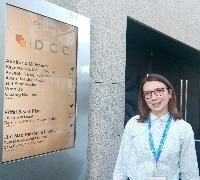Day two of IDCC18 explored not only how we can better support data management, but also what we can do with data to meet the aims of our organisations, and finally how we can work together to create more inclusive communities that support innovative solutions. Inclusivity was also the theme of the closing remarks, which revealed that the conference organisers had taken steps to encourage a more even gender balance in the contributing voices. The overall atmosphere of the second day was one of being invited to consider new possibilities, adopt new approaches and contribute to the conversation.
Possibilities for the exploitation of data to meet the wider aims of our organisations were highlighted in the first keynote of day two. Luis Martínez-Uribe, Data Scientist at the Fundación Juan March, explored the potentia l benefits of augmenting data curation with analytics, with examples from the activities of the DataLab at the Library of Fundación Juan March. These ranged from using artificial intelligence to automatically transcribe audio from lectures and extract keywords from the text, to analysing social media such as reactions to Tweets to learn more about the organisation’s users and inform communications strategy.
l benefits of augmenting data curation with analytics, with examples from the activities of the DataLab at the Library of Fundación Juan March. These ranged from using artificial intelligence to automatically transcribe audio from lectures and extract keywords from the text, to analysing social media such as reactions to Tweets to learn more about the organisation’s users and inform communications strategy.
Analysing Tweets was just one example of how this approach offers a means of providing valuable insights which can be used to inform strategy. When asked how a library might approach building its own DataLab, the advice was to start with analysing your own data - the library catalogues – and experiment with different tools to find what works for your organisation. It’s exciting to think about how blending analytics with data curation could be applied to help address some of LSE’s wider aims. Student experience is a high priority and this approach presents opportunities to better understand how students use library services, which could help to inform decisions about how to develop these to improve user experience.
Practical lessons learned focused on data management plans, with papers on DMP templates, remediation DMPs and active DMPs. Eliane Blumer and Fantin Reichler from EPFL Library discussed their DMP template, a collaborative effort developed with other organisations which incorporates supplementary tools to support researchers. These tools include informing researchers about who to contact if their data is under licence and indicating acceptable file formats for preservation and re-use purposes. A real-life example of a remedial DMP project was presented by Clara Llebot Lorente from Oregon State University, which demonstrated an approach for recovering very messy research data. The task of curating the project data, gathered over many years, was enormous. Llebot Lorente’s approach was to take the elements of a DMP and adapt the structure to include a research data inventory. Although this was effective, the amount of effort required underlined the necessity of having a DMP in place from for the outset to avoid having to curate messy data retrospectively.
 Collaboration and inclusion were the themes of the final keynote, given by Nancy McGovern, Director of Digital Preservation at MIT Libraries. Her talk explored how bringing together a diverse range of collaborators could help to develop innovative solutions and support sustainable digital curation and preservation. McGovern discussed the importance of actively engaging collaborators throughout the process and highlighted inclusion, in terms of social background and demographics, different professional roles and varying degrees of technical knowledge, as key to working collaboratively. The benefits of professional inclusion were to bring together a range of skills from domains such as digital curation, data science and information technology, under the more inclusive term digital practice.
Collaboration and inclusion were the themes of the final keynote, given by Nancy McGovern, Director of Digital Preservation at MIT Libraries. Her talk explored how bringing together a diverse range of collaborators could help to develop innovative solutions and support sustainable digital curation and preservation. McGovern discussed the importance of actively engaging collaborators throughout the process and highlighted inclusion, in terms of social background and demographics, different professional roles and varying degrees of technical knowledge, as key to working collaboratively. The benefits of professional inclusion were to bring together a range of skills from domains such as digital curation, data science and information technology, under the more inclusive term digital practice.
Above all, people should feel safe, and creating an environment that encourages contributions from a diverse range of collaborators is key. Fostering inclusion and diversity is a priority at the LSE and the approaches described could be applied to help develop new ways of promoting an inclusive community. For example the idea of radical collaboration, an approach which involves bringing together a diverse range of collaborators who are actively engaged and encouraged to contribute, could help to facilitate new collaborative projects and generate innovative solutions.
McGovern drew attention to a lack of diversity among those engaged in digital practice, demonstrating how we can address this through inclusion and collaboration. This echoed the decision to address gender unbalance at IDCC18 by having all female chairs as well as inviting women to ask the first questions. The decision to give preference to females when taking the initial questions was based on recent research indicating that the gender of the first person asking a question influences the proportion of women who subsequently ask questions. We were only made aware of these decisions at the end of the conference, when Kevin Ashley gave his closing remarks. Until then I hadn’t noticed that all the chairs were female. It didn’t seem at all unusual, which is what I think the conference was aiming for, to create an atmosphere in which everyone feels comfortable to voice their opinions.
Clare attended IDCC 2018 with support from the DPC's Leadership Programme which is generously funded by our Commericial Supporters Arkivum, MirrorWeb and Preservica.










































































































































